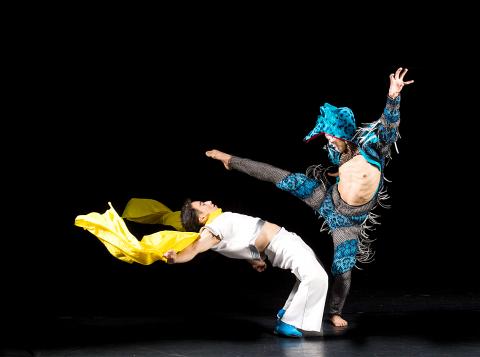The Neo-Classic Dance Company (新古典舞團) opens its new production, Le Petit Prince 3.0 (小王子 3.0), at the National Theater in Taipei on Dec. 11 for a three-show run.
The 91-year-old founder and artistic director of the troupe, Liu Feng-shueh (劉鳳學), said the show is her third attempt at creating a production based on Antoine De Saint-Exupery’s 1943 book.
Liu said the the show is “a return to innocence” because it is not only aimed at children, but the 22-member cast includes children ranging in age from four to 11.

Photo Courtesy of Neo-Classic Dance Company
“The children may not have the technical expertise of the dancers, but their natural instinct and imprecise movements break down the barriers of stereotypical dance,” she told a press conference in late October.
Children have always provided her with endless inspiration, she said.
For those who have never read the story or seen the countless TV show or movie versions, Le Petit Prince tells the tale of a downed pilot’s encounter with a visitor from asteroid B-612 — a home with three volcanoes, but so small the prince can walk around it in just three steps. His most cherished possession is a rose, which arrived as a seed and has been nourished into a very needy blossom.

Photo Courtesy of Neo-Classic Dance Company
The prince asks the pilot to draw him a picture of a sheep, something he needs to help keep the predatory baobab trees that inhabit his asteroid under control.
In return, the prince tells the pilot of his visits to other planets and the people and creatures he has met — including a king, a lamplighter, a businessman, a fox — provide lessons in human frailty and adult foolishness.
For the show, Liu has wisely chosen to highlight the prince’s visits to just three planets.
Liu has a very talented production team behind her, including Chang Yi-cheng (張一成), who, along with Liu, created the stage design, music by award- winning composer and harpist Lee Che-yi, costumes by Weng Meng-ching (翁孟晴) and lighting by Li Jun-yu (李俊餘).
Tickets have been going fast, with just about 60 left for the Friday night’s show and a handful for the Dec. 13 matinee.
NORDIC
Dance lovers looking for a something to see this weekend might want to check out a much smaller production at the Songshan Cultural and Creative Park, Yeh Ming-hwa’s (葉名樺) Nordic, being performed as part of this year’s Points on Stage@Lab at the park’s newly-opened LAB Creative Lab.
The four performers include Yeh — who once danced with the Connecticut-based Thomas/Ortiz Dance Company and Kaohsiung City Ballet (高雄城市芭蕾舞團); her husband Chen Wu-kang (陳武康) — cofounder of Horse (驫舞劇場); Taoyuan-based ethnomusicologist and overtone singer Mark van Tongeren and Sheng (晟).
The show was inspired by a trip Yeh took to Scandinavia — the winter sun, short daylight hours, the Northern Lights, the light refractions of ice crystals and the seemingly pristine landscapes.
The show may be smaller in scale than Neo-Classic, but its running time is a full three hours. However, I was assured that Yeh does not necessarily expect the audience to make it through the show without shifting — they can step outside for a break or a drink of water and then return to their seats.

June 2 to June 8 Taiwan’s woodcutters believe that if they see even one speck of red in their cooked rice, no matter how small, an accident is going to happen. Peng Chin-tian (彭錦田) swears that this has proven to be true at every stop during his decades-long career in the logging industry. Along with mining, timber harvesting was once considered the most dangerous profession in Taiwan. Not only were mishaps common during all stages of processing, it was difficult to transport the injured to get medical treatment. Many died during the arduous journey. Peng recounts some of his accidents in

“Why does Taiwan identity decline?”a group of researchers lead by University of Nevada political scientist Austin Wang (王宏恩) asked in a recent paper. After all, it is not difficult to explain the rise in Taiwanese identity after the early 1990s. But no model predicted its decline during the 2016-2018 period, they say. After testing various alternative explanations, Wang et al argue that the fall-off in Taiwanese identity during that period is related to voter hedging based on the performance of the Democratic Progressive Party (DPP). Since the DPP is perceived as the guardian of Taiwan identity, when it performs well,

The Taiwan People’s Party (TPP) on May 18 held a rally in Taichung to mark the anniversary of President William Lai’s (賴清德) inauguration on May 20. The title of the rally could be loosely translated to “May 18 recall fraudulent goods” (518退貨ㄌㄨㄚˋ!). Unlike in English, where the terms are the same, “recall” (退貨) in this context refers to product recalls due to damaged, defective or fraudulent merchandise, not the political recalls (罷免) currently dominating the headlines. I attended the rally to determine if the impression was correct that the TPP under party Chairman Huang Kuo-Chang (黃國昌) had little of a

A short walk beneath the dense Amazon canopy, the forest abruptly opens up. Fallen logs are rotting, the trees grow sparser and the temperature rises in places sunlight hits the ground. This is what 24 years of severe drought looks like in the world’s largest rainforest. But this patch of degraded forest, about the size of a soccer field, is a scientific experiment. Launched in 2000 by Brazilian and British scientists, Esecaflor — short for “Forest Drought Study Project” in Portuguese — set out to simulate a future in which the changing climate could deplete the Amazon of rainfall. It is